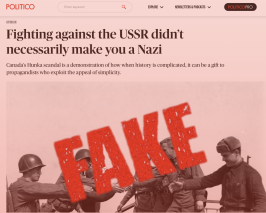The article “Fighting against the USSR didn’t necessarily make you a Nazi”, which appeared in “Politico” on 2 October 2023, is the clearest example of the cynical manipulation of history.
According to British scholar Keir Giles, author of “Russia’s War on Everybody” book, the scandal which unfolded in the Canadian Parliament this September is nothing but "a demonstration of how when history is complicated, it can be a gift to propagandists who exploit the appeal of simplicity”. He claims that Yaroslav Hunka – an SS soldier who fought against the Soviet troops on Germany’s eastern front – is not a Nazi, but rather a man of difficult fate who faced “an excruciating choice over which of these two terror regimes to resist”. Allegedly, the idea that “foreign volunteers were being allocated to the Waffen-SS on administrative rather than ideological grounds is a hard sell for audiences conditioned to believe the SS’s primary task was genocide”. Moreover, the author presumes that repeated exhaustive investigations carried out not only by the Nuremberg trials but also the British, Canadian and even Soviet authorities, prove that no war crimes or atrocities were committed by Yaroslav Hunka’s unit.
Russia, “clinging to simple narratives” started “shouting about Nazis, real or imaginary, in Ukraine or elsewhere” and given the “history of aggression and atrocities” committed by the Kremlin during World War II and its aftermath, “there’s a special cynicism underlying the Russian accusations”. Allegedly, “the Soviets and the Nazis had so much in common that it’s now illegal to point these similarities out in Russia”, but unlike Nazi Germany, leaders and soldiers of the Soviet Union were never put on trial for their war crimes.
Any accusations and further discussion of the “error” has to be, in Keir Giles’ opinion, carefully phrased, as “contrition for honoring a Nazi would acquiesce to the rewriting of history by Russia and its backers”. The author continues by stating that Yaroslav Hunka should never have been invited to the Canadian Parliament, not because he is a Nazi and a criminal, but to prevent this misstep from “providing a golden opportunity for Russian propaganda”.
Many in the West seem to have forgotten what the truth, conscience and moral are. In fact, the article by Keir Giles aspires to be regarded as a kind of "guidelines" for those who have not yet gained experience in the promotion of neo-Nazism in Western countries. The logic that the author tries to impose is a sort of manual for those who seek justification for their own actions that contribute to the escalation of contemporary forms of racism, racial discrimination, xenophobia and related intolerance. The only conclusion that emerges is that, alas, it is not only Ukraine that needs denazification today.























